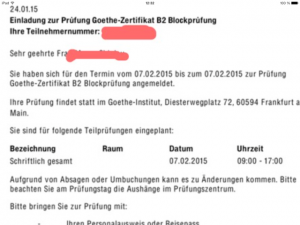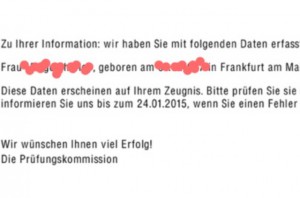One of my acquaintances was not able to sign up online for the German language proficiency test with the Goethe Institute in Frankfurt. At the end of each try, she was told that underage applicants could not register.
A short phone call to the Goethe Institute in Frankfurt clarified this issue. Here is what you have to do:
- Go to the Goethe Institute Frankfurt office with a parent.
- Bring identification with you (for both).
- Your parent needs to sign the ‘Agreement of Terms’ (German: Einverständniserklärung) at the office.
- Registration is done there at the office.
- Payment for the exam can be made by EC Card.
- If cash only, then the hours for accepting cash payments are: 9:00 – 14:30.
If you have any further questions or comments, please share them in the comment section below.





